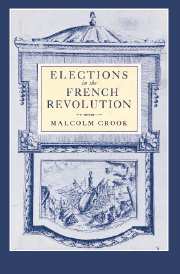Book contents
- Frontmatter
- Contents
- List of maps
- List of tables
- Acknowledgements
- List of abbreviations
- Introduction
- 1 Subjects to citizens? The elections to the Estates General and the Revolution
- 2 Limits of citizenship: The franchise question, 1789–1791
- 3 Biting on the ballot: From enthusiasm to abstention, 1790–1791
- 4 One man one vote? The experiment with electoral democracy in 1792
- 5 Voting the Constitution: The referenda of 1793 and 1795
- 6 Parties, schisms and purges: Elections under the Directory, 1795–1799
- 7 An invisible aristocracy? The departmental assemblies and the emergence of a new political class
- Conclusion
- Bibliography
- Index
2 - Limits of citizenship: The franchise question, 1789–1791
Published online by Cambridge University Press: 03 November 2009
- Frontmatter
- Contents
- List of maps
- List of tables
- Acknowledgements
- List of abbreviations
- Introduction
- 1 Subjects to citizens? The elections to the Estates General and the Revolution
- 2 Limits of citizenship: The franchise question, 1789–1791
- 3 Biting on the ballot: From enthusiasm to abstention, 1790–1791
- 4 One man one vote? The experiment with electoral democracy in 1792
- 5 Voting the Constitution: The referenda of 1793 and 1795
- 6 Parties, schisms and purges: Elections under the Directory, 1795–1799
- 7 An invisible aristocracy? The departmental assemblies and the emergence of a new political class
- Conclusion
- Bibliography
- Index
Summary
In June 1789 deputies at the Estates General seized power and, in the name of the people, proclaimed a new parliament, the National or Constituent Assembly. This declaration of popular sovereignty placed the issue of who should vote, and how they should do so, at the heart of the political agenda. The prospect of direct democracy had been raised in 1789, but it was generally acknowledged that the size of the country necessitated a representative system of some sort. The sovereignty of the people was accordingly translated into the election of legislators and administrators. The intricacies of the franchise question provoked some acrimonious debate in the Assembly between 1789 and 1791 for, as Montesquieu had remarked, ‘the laws which establish the right of suffrage are fundamental to any state’. The conflict over restrictive measures has, however, been misconstrued by many historians, while their impact and application also require a comprehensive reassessment.
In a report which he presented to the newly created Comité de Constitution, towards the end of July 1789, the influential abbé Sievès suggested drawing a distinction between ‘active citizens’, who would vote and ‘passive citizens’, who would not.
- Type
- Chapter
- Information
- Elections in the French RevolutionAn Apprenticeship in Democracy, 1789–1799, pp. 30 - 53Publisher: Cambridge University PressPrint publication year: 1996



